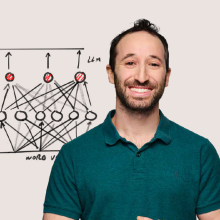Going where the questions take him
New scientists

Dr. Oren Raz—a theoretical physicist who studied a series of very different subjects during the course of his academic training— has made a career out of following wherever the best questions lead him. And they have led him to the Weizmann Institute.
Dr. Raz earned his BSc at the Hebrew University as a member of Talpiot, an elite program for IDF recruits who show outstanding potential for leadership in physics, math and computer science. At the same time he completed his military training, and after serving as a naval officer on a submarine for a number of years, he made landfall at the Technion, where he pursued his MSc in a waterrelated discipline: fluid mechanics.
Dr. Raz’s early research focused on clarifying the laws governing how very tiny objects move through liquid media. “Hydrodynamics is at the heart of the flow-based systems that many scientists use to identify chemical and biological interactions, and is also central to future technologies like nano-robots that are capable of traveling through the bloodstream to perform surgery,” he says. In his masters degree, he examined the forces affecting how microscopic particles “swim” under different flow conditions.
For his PhD studies—under the supervision of Prof. Nirit Dudovich at the Weizmann Institute—Dr. Raz dove into something entirely new. “After several years as a theorist, I thought I’d try my hand examining practical problems in ultra-fast optics,” he recalls. “But while I learned a great deal about coupled lasers, I also learned that experimental science is not for me. In my postdoc, I switched directions again.”
Joining the group of Christopher Jarzynski at the University of Maryland, Dr. Raz began work on a classic and unsolved problem related to thermodynamics.
“Eighteenth-century theorists established laws about efficiency in energy transfer—such as the heat that produces mechanical work in a steam engine—but their laws applied only to systems in equilibrium that do not change over time,” Dr. Raz says. “This creates a problem because transfer of energy, by its very nature, puts an end to a system’s equilibrium state. Essentially, the laws of thermodynamics have always failed to take ‘dynamics’ into account.”
As he continues to think of ways to improve thermodynamic theory, Dr. Raz is happy to be back in Rehovot, where he grew up, and where his mother, an electrical engineer, spent many years designing specialized lab equipment. Today, he looks forward to making his own contribution, by devising new ways to measure or mathematically reconstruct properties of the systems that his experimentalist colleagues care about.
Dr. Oren Raz completed his BSc in mathematics as part of the Talpiot program at the Hebrew University of Jerusalem in 1999. He completed an MSc in physics magna cum laude at the Technion–Israel Institute of Technology in 2007, and his PhD working with Prof. Nirit Dudovich in the Department of Physics of Complex Systems and Prof. Boaz Nadler in the Department of Computer Science and Applied Mathematics at the Weizmann Institute in 2013. He conducted research as a postdoctoral fellow at the University of Maryland.
Among his academic and professional honors, Dr. Raz received the Vivian Konigsberg Award for Excellence in Science Teaching at the Technion in 2006, and was supported by a fellowship for converging technologies for outstanding PhD students from 2009 to 2013. He won a Wolf Foundation prize for excellent PhD students in 2010 and the Dostrovsky Prize in 2013. He won the Giora Yoel Yashinski Memorial Prize of the Feinberg Graduate School in 2013, and a James S. McDonnell postdoctoral fellowship from 2014 to 2017.
Dr. Oren Raz is supported by The Abramson Family Center for Young Scientists, the Barton Award for Young Scientists, the Harmstieg New Scientist Fund, and Mr. and Mrs. Dan Kane.








